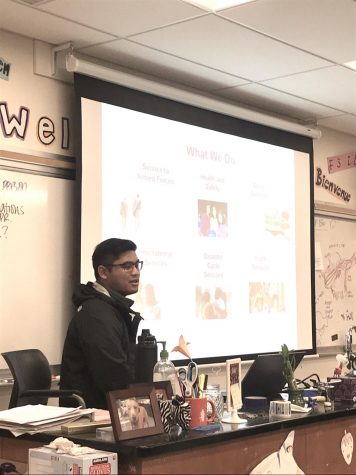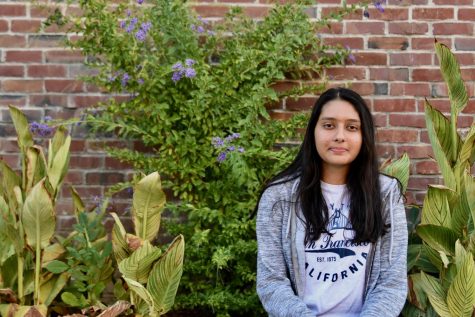Americorps member presents at Red Cross meeting
Timothy Fader educates Red Cross members on disaster preparation
March 18, 2019
On March 7, Americorps member Timothy Fader attended Red Cross’ lunch meeting and spoke to the members about disaster preparedness and the function of Red Cross on both a community and global level.

As proactive disaster response is Red Cross’ overarching goal, Fader extensively discussed earthquake preparedness and home safety. He explained safety procedures and emergency supplies in detail, hoping that the information he relayed to the students would be shared throughout the community.
“My hope is that the people who were at this presentation would bring that information home so they could prepare their families in case there is an earthquake or home fire,” Fader said.
While crisis response is one of Red Cross’ main initiatives, Fader explains that since Red Cross is a large, global organization, there are many diverse projects and opportunities to get involved, such as aiding vulnerable populations or providing support to the armed forces. Furthermore, he believes that the skills Red Cross fosters at the high school level are relevant to life beyond volunteering.
“The Red Cross offers many different service opportunities and I think they’re all applicable to whatever career field you may find yourself in,” Fader said. “For example, with CPR and first aid, no matter where you are in the world, if there is a person that’s struggling because of a heart attack or a stroke or they’re choking, Red Cross prepares you for that. In my opinion, that’s one of the keystones that our organization stands for, going out of your way to prepare yourself for any disasters or emergencies that may happen.”
As an Americorps Youth Service coordinator, Fader has worked extensively with students in Red Cross and witnessed the change high schoolers are able to enact firsthand. One beneficial program Fader has seen high schoolers execute is the veteran food drive, where home-cooked meals are brought to veteran homes.
“We’re able to directly communicate with [the veterans] and just offer service as simple as dinner,” Fader said. “The food is not covered by the [veteran] house so they eat simple sandwiches or salads that they can find in the cafeteria, which ends up being bland and monotonous. Having a home-cooked meal for them, it breaks away from that monotony and gives them something to look forward to, just a little bit of hope.”
Although Fader believes that the Bay Area youth chapters are largely beneficial to their communities, he sees potential for improvement. He believes helping high school volunteers develop professional and networking skills would enrich both the Red Cross volunteer community and those of the high school volunteers.
“A lot of the volunteers with the Red Cross end up being sophomores or juniors or often even seniors, they’re heading into college,” Fader said. “Helping them develop their resumes but also building skills that mean more than just resumes is important. It would really tie everyone together, if we worked on professional development and networking.”
Fader believes that it is crucial for high school Red Cross volunteers to understand that their actions and sacrifices — no matter how seemingly inconsequential — do have an impact on their communities. He explains that in a vast, international organization like Red Cross, it can be difficult to see the direct impact individual contributions are making.
“The smaller things are what matter, especially when you’re in an organization like Red Cross,” Fader said. “A lot of times, when you’re focused more on grand-scheme things, what gets overlooked are the smaller, little victories you have along the way, like someone sacrificing their time to make sure that a poster gets made. Everyone is contributing in their own ways, but appreciating them all is important.”



























